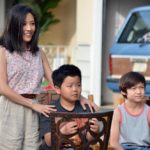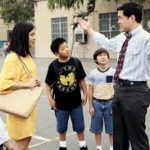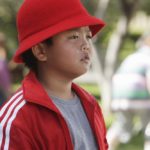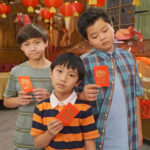
Research Essay

Asian-American Representation in the Media
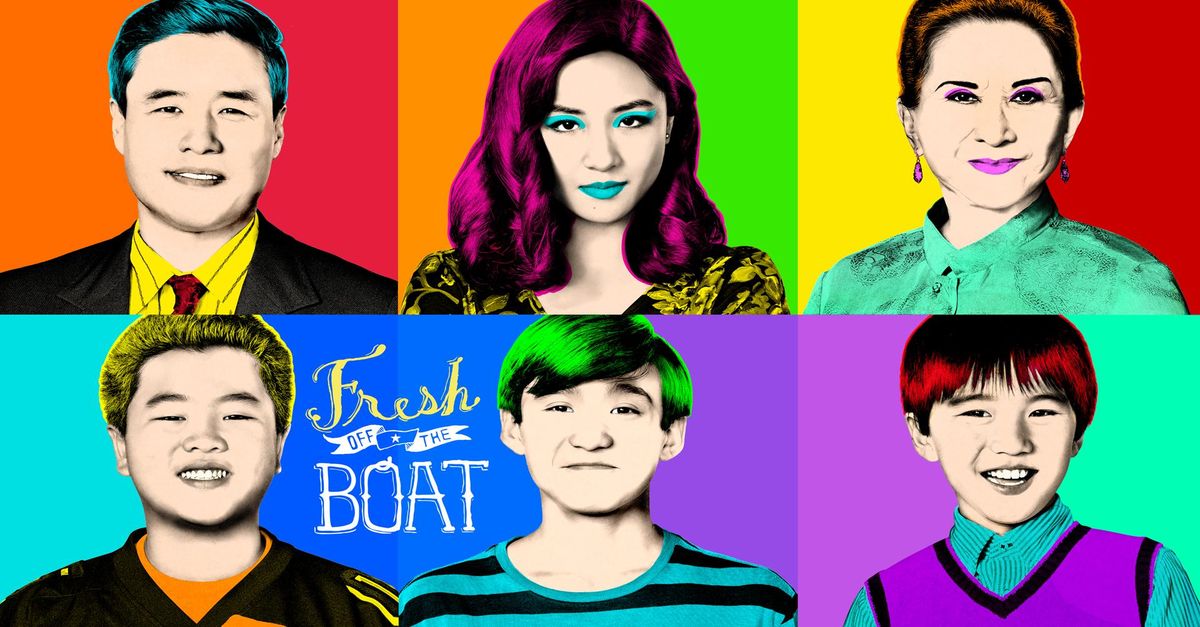
Throughout cinema history, we often see white actors taking lead roles in movies. Many of the biggest movie stars at the were white actors/actresses including Marilyn Monroe, Marlon Brando, Audrey Hepburn, and Charles Chaplin. It was rare to see people of color take on a lead role, and if there was a role meant for people of color, they were often supporting characters or played by white actors in an offensive stereotype, also known as yellowface. We can see this being portrayed with the Asian/Asian-American community in movies such as Breakfast at Tiffany’s (1961), Genghis Khan (1965), and even within movies and shows made in the last 20 years including Magic in the Moonlight (2014) and How I Met Your Mother (2014). There have also been roles meant for Asians that were given to white actors such Emma Stone in Aloha (2014) and Scarlett Johansson in Ghost in the Shell (2017), both being criticized as whitewashing Asian culture. In recent years, there has been a demand for more positive Asian representation in media that do not rely on stereotypes to tell a story. The semi-autobiographical ABC sitcom Fresh Off the Boat (2015), based on the book with the same title by Eddie Huang, has brought Asian representation to a broader audience and sharing the experience of a Chinese-American boy dealing with cultural differences between his family and friends in the 90s-which is relevant to many Asian Americans that may deal with stereotypes and racism but are often brushed to the side; however sharing stories of Asian Americans like Eddie’s shows how not all Asians are the same.
In Season 1 of Fresh Off the Boat, set in the year 1995, we are introduced to the Huang family, which consists of the protagonist Eddie Huang (played by Hudson Yang), Jessica (Constance Wu), Louis (Randall Park), Emery (Forrest Wheeler), Evan (Ian Chen), and Grandma Jenny (Lucille Soong); driving from Chinatown D.C. to Orlando, Florida leaving all they know to pursue Louis’ dream of owning an American steakhouse. In the first episode, narrated by Eddie Huang, we can already see that Eddie is huge hip-hop fan listening to his favorite rappers such as Nas, Biggie Smalls, Tupac, and NWA. There have been many stereotypes of East Asians the least masculine out of all the races, however, we see that Eddie is very in touch with his masculinity and often displays that in his clothing style and his music preferences mainly being hip hop or rap. Upon arrival at Orlando, Eddie and his brother Emery realize that they are the only Asians in their majority white suburb. They are greeted by neighbor Deidre who is part of the welcoming committee. When asked where they are from, Eddie replies with, “My parents were born in Taiwan, but my brothers and I were born in D.C.”. Deidre responds with “Oh! You’re English is very good!”. (Season 1, Episode 1, Minute 4). This shows another stereotype that all East Asians have an accent or can’t speak English, even when Eddie explicitly states that he was born in Washington D.C. and are clearly speaking fluent English.
Fast-forward into the episode, Eddie starts his first day at a new school. While trying to make some friends during lunch, many of the students at the table teased him about his lunch being weird, smelly, and calling them worms. This isolates Eddie from the rest of the students and causes himself to slowly dislike his Taiwanese culture. The majority white neighborhood is not used to having someone who is of another race living in the same area, which often displays their ignorant comments about Chinese culture. On the 17th minute of the first episode, Eddie finally goes to school with the American food that he begged his mother for. While warming up his Lunchables, he is pushed around by Walter, a black student and the only other minority in the school. Walter shouts “You’re at the bottom now!”. Eddie says that he is not at the bottom and Walter replies with “Yes you are! It’s my turn, chink!” (Season 1, Episode 1, Minute 18). Eddie is sent to the principal’s office for what is believed to be a physical fight between him and Walter This is a clearly a racist comment directed towards Eddie. “Chink” is a racial slur that is used against people of Chinese descent. Jessica and Louis stop by the office and are very disappointed at the principal for not having Walter and his parents in the office and is not getting any consequences for calling Eddie a chink. This further debunks the myth that “Asians don’t face racism” because they are the “model minority” and also shows how Asian racism is not taken seriously and is just brushed under the rug. There was quite a bit of shock when the racial slur was used in the show. Eddie Huang, the author of the book with the same title, had defended the use of the slur by saying, “If you’re going to be real and have a real discussion about [race and racism], then you have to use it”. (Nguyen, “A closer look at “Fresh off the Boat”). In this case, Huang is right because it helps us see how harmful any racial slur is to any minority and it shows the impact the slurs have on the people it’s targeting. After the premiere of the first episode, there have been responses coming from Asian Americans. According to Dmae Roberts’ article “The all-American Sitcom”, it briefly discussed how the slur “chink” was used, especially in the first episode. “On premiere night, the Twitterverse erupted with tweets from Asian Americans about cathartic the show was and how it brought up memories of the first time they were called a racial slur. Throughout the evening, people were commenting so much on Twitter that “Fresh off the Boat” became a trending topic with mostly positive tweets” (Roberts, 2015). Roberts also stated that the scene with the slur was a “teachable moment”. She further says “It’s a milestone for network television when Asian American parents call out the administration of a school for not punishing a student for using the term against their son” (Roberts, 2015). It is important for the Asian American community to have their voices heard when they speak out against racism and prejudice in the areas, they live in. With the overwhelmingly positive Twitter responses from Asian Americans on the premiere night, it shows that inclusion and positive representation of Asians living in America are needed to bring awareness of what the community deals with; whether it be little ignorant or extremely racist comments.
Eddie experiences cultural differences within his own household. In the first 2 minutes of episode 7, Eddie asks his mother to go to a Beastie Boys concert and has constantly asked to go to the Wu-tang Clan, Dr. Dre, and Snoop Dogg concert but was not allowed to go. Jessica then says “Eddie, I just don’t understand you… the music you listen to, the way you talk, your clothes… why can’t you be a good Chinese boy like Evan and Emery? They both study hard, play violin” (Season 1, Episode 7, Minute 1:50-2:02). Eddie has different interests than his brothers, where he listens to rap music, is rebellious, and is very much obsessed with African American culture-unlike Evan and Emery, where they are always studying, and are being “good Chinese boys”. Although being the eldest, Eddie is often being compared by his mother to his younger siblings and feels pressured to follow Jessica’s expectation of a perfect Chinese boy, and pressured by society to fit in as much as possible so he would not be an outcast.
A few moments later, a new student arrives at Abraham Lincoln Middle School who is assumed to be Chinese. Eddie finally meets Phillip Goldstein and shows him around the school. He is excited due to the fact that there’s finally another Chinese person in their majority white school. While getting to know each other, Eddie finds out that his parents are not Chinese and was adopted by Jewish parents. The more they talk, they realize they have nothing in common and is, in fact, the opposite. He likes musicals, investments, Tolstoy, and is not allowed to watch tv on Fridays because of Shabbat. Since they find each other’s company as Phillip puts it, “undesirable”, they try to distance themselves from each other. However, they always seem to be paired up in classes by teachers due to them being the only Chinese kids. Jessica finally meets Phillip and is very happy to meet another Chinese boy. She is very impressed by his interest in cello, his responsibility, and his schoolwork. Although Jessica says that she constantly talks about Phillip because she finally is meeting another Chinese person in the community and wants the boys to look out for each other, it seems that she wants Eddie to be more like Phillip and wants him to have a better influence on Eddie. This goes back to her wanting Eddie to be a “good Chinese Boy”. This immense pressure can be seen in many Asian American families that they should be perfect, getting good grades, working extremely hard in school and being the best is the only option. Eddie does come from a family where the mother is very hard on him, however, he is living a relaxed life and doesn’t stress about anything. However, at the end of the episode, Jessica tells Phillip that she is ashamed of him for leaving Eddie alone when he promised to go to the Beastie Boys concert. She then tells Philip that he is “not a good Chinese boy”, taking Eddie’s side in the situation. This is refreshing to see because many Asian families may not realize that being good or the best does not only come in academics or interests. This scene shows how being selfless, caring, and taking the time out of your day to do things for others, is what it really means to be a good person.
In the season finale, the Huangs face a conflict within themselves assimilating into American culture too well. The intro explains how they have settled into Orlando. Eddie became the Abraham Lincoln Middle School’s president, Louis’ restaurant is doing very well, Evan and Emery are excellent in their academics, and Jessica has been “assimilating like a fiend” (Season 1, Episode 13, Minute 1:05), by having a successful real estate career in a span of a few months. However, they don’t realize it until it is pointed out by their friends Marvin and Honey. Jessica goes through an identity crisis with the family and wondering if she’s still “Chinese enough” and that they’re too American. Thinking she is overreacting, she notices how the boys don’t speak Mandarin and that instead of having a Chinese dinner, they have macaroni and cheese. She decides to make changes around the house, including eating more Chinese food, taking the shoes off in their home, speaking more Mandarin, and forbidding Louis from joining the country club “filled with white people doing white people things”.
This occurs around the same time where Eddie’s school is hosting World Culture Day, where he is assigned Iceland but is desperate to get Jamaica. As soon he switches with another student, Jessica steps in and makes the principal assign Eddie with China. Eddie is angered because he believes that China has nothing cool or fun to offer. Fast forward to the 18th minute to World Culture Day with Eddie doing his project on Jamaica, Eddie discusses how any country would have been better than China. Trent proceeds to joke around saying that all that China has were pandas. (minute 18). Eddie doesn’t find it amusing and defends China. “You know what’s cool? A wall you can see from space… China. We got 5,000 years of history, dawg. Same with those air Jordans you love so much. Just do it? Just made it… in China” (Season 1, Episode 13, Minute 19). It is refreshing to see Eddie standing up for his culture because as kids, many Asians are made fun of their cultural practices for being different and “not American”. This shows that some Americans are not aware of other cultures and what they offer. It also brings light to what it means to be a “true American”. Growing up, kids may have a hard time trying to identify with either society because of major cultural difference within both sides. Fresh Off the Boat normalizes how coming from a different cultural background is not something to be embarrassed by, when in fact you should embrace and be proud of it.
Observing the characters throughout the series, the Huang family are just like any other American family working hard. Each character has their own individuality, most notably Eddie and Jessica. Eddie’s character (played by Hudson Yang) is loosely based off of the American chef, author, restaurateur, and producer, Eddie Huang. Eddie shows charisma with fashion choice, the way he talks, and the music he listens to. He is much more laid back than the rest of the family and very relatable to younger viewers when it comes to his attitude towards school and doing chores. Jessica (played by Constance Wu) is a pretty strict mother who is more comfortable with Chinese culture and is oblivious to the American lifestyle. “She’s obviously an immigrant, she didn’t grow up in American culture, she didn’t grow up speaking the language, so she has an accent, yet she still doesn’t think that’s any reason for her not to have a voice. She still has confidence in her point of view, even when exterior forces encourage her not to. She still stays true to herself” (Jones, 2017). Jones explains this very well with Jessica’s personality and character. Although she is an immigrant from Taiwan, she is not afraid to use her voice and stand up for herself-just like how we see her defending Eddie in the first episode when he is involved with a physical fight when being called a racial slur. In addition, she is a college graduate, successfully becomes a real estate agent, and later goes on to writing and publishing her first novel. She is the definition of achieving the American dream for her family and herself.
The representation of Asian-Americans in media is necessary to share the stories of Asians in their perspective. Many don’t realize how much representation in film and television affects viewers and how much of an impact it has on their lives. Constance Wu has shown frustration with the lack of Asian representation and whitewashing roles by stating “stop perpetuating the racist myth that [only a] white man can save the world” and “when people whitewash roles, usually they’re people who have good intentions, but they just don’t know and the only way you make them know is to start a conversation”. (Jones, 2017). Wu further explains the reactions she has gotten from the Asian-American community on her role in the tv series. “I get people coming up to me in tears because they are so moved by the fact that there is a show where Asian-Americans are front and center. And not only that, their ethnicity is important to the character, rather than being incidental.” (Jones, 2017). The fact that she has people coming up to her who are very emotional and proud to have people like them on their television screen in a very long time. The Asian community deserves to have their stories heard in entertainment so that society can normalize Asian culture and so that society does not make stereotypical, racist, and/or ignorant comments and show how the Asian community is diverse and don’t follow people’s expectation of what an Asian is supposed to be.
- Jessica, Eddie , and Emery (Forrest Wheeler)
- The Huang Family on the school’s basketball court
- Jessica and Louis Huang (played by Constance Wu and Randall Park)
- Young Eddie Huang (played by Hudson Yang)
- The Huang Family
- Eddie before getting into a fight when called a racial slur
- The Huang Brothers: Eddie, Emery, and Evan (Ian Chen)
Works Cited
- Chiang, Jeff, and Eric Ziobrowski. “Fresh Off the Boat/Phillip Goldstein.” Season 1, episode 8, 10 Mar. 2015.
- Jones, Ellen E. “Diasporhahaha! How Fresh Off the Boat Reshaped Sitcom Convention.” The Guardian, Guardian News and Media, 18 Nov. 2017, theguardian.com/tv-and-radio/2017/nov/18/how-fresh-off-the-boat-reshaped-sitcom-convention.
- Khan, Nahnatchka. “Fresh Off the Boat/Pilot.” Season 1, episode 1, 4 Feb. 2015.Apr. 2015.
- Nguyen, V. (2014, Jun). A closer look at ‘fresh off the boat’.Northwest Asian Weekly
- Roberts, D. (2015, Feb 16). The All-American sitcom.Asian Reporter
- Shah, Sanjay. “Fresh Off the Boat/So Chineez.” Season 1, episode 13, 21


